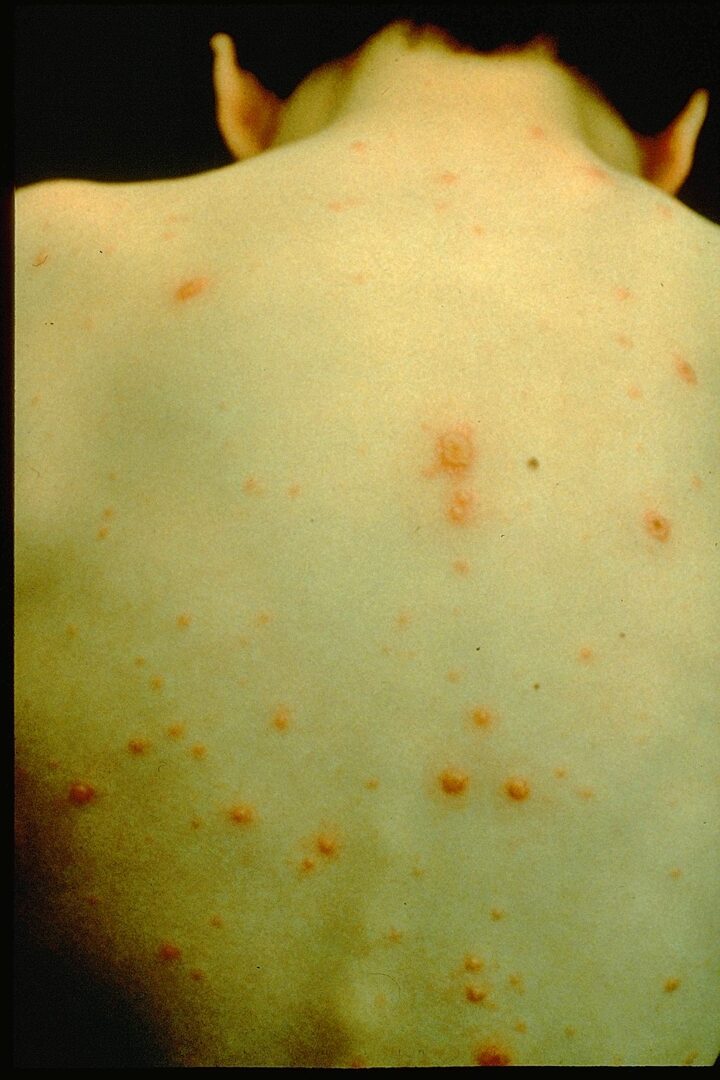Once a Childhood Rite of Passage, Chickenpox is Vaccine Preventable
Most adults recall their experiences with chickenpox with great detail. I remember that I was visiting my grandparents in Florida and they had planned to bring me to a Liberace concert. Even though, at the age of nine, I had no idea who he was, I recall my grandmother being quite excited. However, once my rash appeared, she couldn’t hide her disappointment. I was contagious and we had to cancel all our plans for the week.
Fortunately, as I was boarding my plane home, we came upon a great commotion in the airport and realized Liberace was there. We shared our story with him and he took a few photos with us. Perhaps this was a small consolation to my grandmother who had to nurse me through my illness. What she recalls most is meeting Liberace. What I recall most is the discomfort of my rash, and my grandmother nagging at me to stop scratching!
Flash forward almost 20 years. I’m having a conversation with my daughter’s pediatrician about the immunizations she was to receive when she mentions the varicella vaccine. When she explains that this is a vaccine for chickenpox, I’ll admit I was a bit surprised.
While I had never had any of the other diseases she would be immunized for, I did have the chickenpox. As uncomfortable as it seemed at the time, looking back I didn’t really think it was dangerous. I’m sure most other parents probably consider chickenpox to be relatively benign, like I did at the time. Perhaps this is why the varicella vaccine is one of the most commonly rejected vaccines. However, while most children manage well through the varicella-zoster virus, it is not always a simple childhood illness.
Complications from the chickenpox can be very serious, resulting in hospitalizations and even death. They include bacterial infection of the skin or other parts of the body including the bones, lungs, joints, and blood, as well as pneumonia or infection of the brain. Before the development of a vaccine, about 11,000 people in the United States were hospitalized each year, and about 100 people would die. Sadly, about half of these deaths were among previously healthy children.
In this week’s featured video, Nathan’s mother describes her son suffering a stroke as a result of what she thought was a benign case of chickenpox. While Nathan survived, his medical challenges continue today.
[youtube=http://www.youtube.com/watch?v=vWb9LOst8m0]
- Unfortunately, the chickenpox vaccine was not available to Nathan, and prior to introduction of the vaccine in 1995, there was an estimated four million cases of chickenpox per year. It is such a contagious illness that if one infected person sits and talks in a room full of 100 people who were not previously infected or vaccinated, than it can be expected that about 85 of the remaining 99 will get chickenpox. However, the success of the vaccine is evident since the number of cases of chickenpox has fallen 83-93% since the introduction of the vaccine in 1995.
While we must be aware that there are risks with every vaccine, I found this comparison from the Children’s Hospital of Philadelphia to be interesting for parents to consider:
Of 1,000 people with chickenpox:
- About 100 will require medical attention
- About two will be hospitalized
- About 50 will suffer from infected blisters; in some cases the bacterial infection is caused by group A streptococcus (GAS). When GAS enters the bloodstream, it can lead to a mild infection or, less commonly, a more severe situation such as necrotizing fasciitis, also known as “flesh-eating bacteria,” or streptococcal toxic shock syndrome (STSS). Necrotizing fasciitis destroys muscles, fat, and skin tissue. STSS causes a rapid drop in blood pressure and organ failure. About 1,500 people die from GAS in the U.S. every year; some of these as a complication from chickenpox. (For another personal story, click here)
- Other complications from chickenpox can include dehydration from vomiting or diarrhea, pneumonia, or swelling of the brain (known as encephalitis).
Of 1,000 children who get the vaccine:
- 700 to 900 will never get chickenpox; of the remaining 100 to 300 who may get chickenpox, the disease is typically less severe.
- About 200 will have redness or soreness where the shot was given
- Less than 50 will experience a mild rash up to one month after immunization
- 100 to 200 will have fever, about one of whom will experience a seizure related to the fever
(It is important to note that people who are allergic to gelatin should not get the vaccine.)
Even though my experience with chicken pox only left a few scars, after my discussion with our pediatrician I had a better understanding of the risks in contracting this disease. Since no one can determine just which child will suffer with dangerous complications, I felt it best to vaccinate my children.
It’s important to also understand that while no vaccine is 100% effective, the chickenpox vaccine is very effective. The Center for Disease Control (CDC) reports that about 8 to 9 of every 10 people who are vaccinated are completely protected from chickenpox and the vaccine almost always prevents against severe disease. If a vaccinated person does get chickenpox, it is usually a very mild case lasting only a few days and involving fewer skin lesions (usually less than 50), mild or no fever, and few other symptoms. That is reassuring to me, especially since I hope to prevent my children from ever suffering from chickenpox. After all, it is vaccine preventable.
